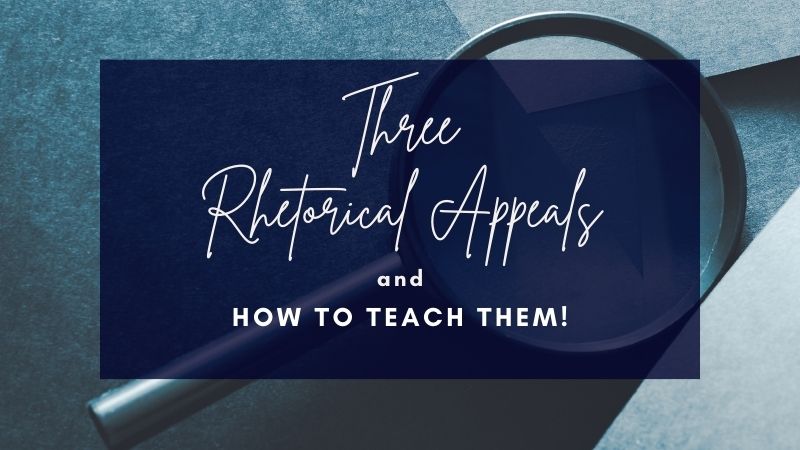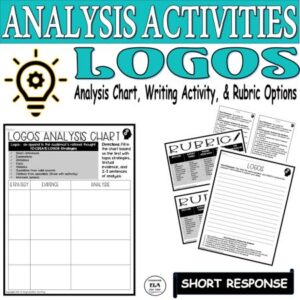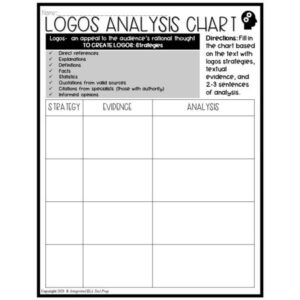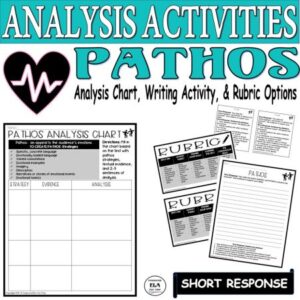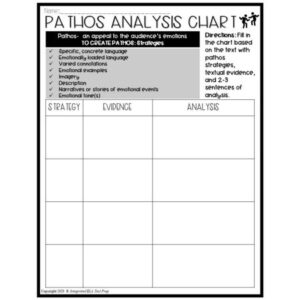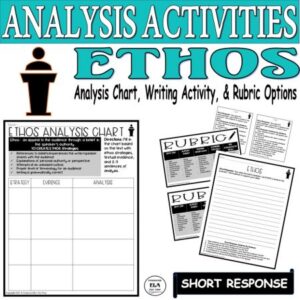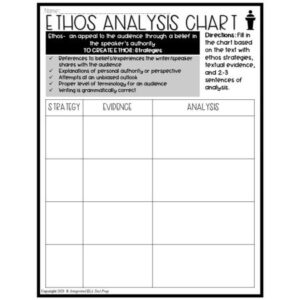We hear the words “three rhetorical appeals” pretty regularly, especially if you are an English teacher. BUT how do we begin to teach them? So often, we get thrown into the deep end of high school English without the life preserver of HOW to teach something. I was taught about the appeals, so I know them, but knowledge is rarely the hard part of teaching.
The pedagogy, or simply put “your beliefs about teaching,” is tough to wrap your mind around. So how do we teach the Three Rhetorical Appeals to our students? Keep reading for tips and tricks to make the very beginning of rhetorical analysis with a focus on the three rhetorical appeals a breeze for both you and your students!
Need help with Test Prep? Check out this FREE Pack of 3 Test Prep Activities to help students achieve success on standardized tests!
Need help with teaching rhetorical analysis? Click to read “5 Simple Steps for How to Do Rhetorical Analysis” for help!
Questions to ask first before tackling rhetorical analysis:
What is Rhetoric?
Rhetoric is the language that uses techniques and strategies for a specific purpose. That is all! We use rhetoric ALL of the time.
Think about it:
- When we want our kids to do something, how do we word our speech?
- When we forget to call a relative to say “Happy Birthday,” how do we begin the phone call?
- When our students start class, how do we respond to a lack of movement?
- When our spouse doesn’t realize how stressed we are, how do we get them to help?
- When we want to buy something, how do we convince ourselves not to?
We use rhetoric every day, and we vary our rhetoric depending on the purpose, audience, situation, and our personal toolbelt of diction, knowledge, and strategies.
To introduce rhetoric, simply ask your students to think about a specific situation:
What might you say to a parent or guardian if you got a bad grade on your report card?
Some responses might include the following:
- I turned in all of my assignments on time, but the teacher forgot to grade five of my assignments.
- I worked so hard every day, but I was overwhelmed by all of my other classes and activities.
- The teacher simply does not like me, and you know me, I always do my very best.
And guess, what? Each of the statements above connects to a rhetorical appeal!
Want to make teaching poetry a piece of cake? Check out 7 Powerful MUST-TEACH Activities & Poems For High School Students!
What is a Rhetorical Appeal?
This is a question I hear all of the time. I teach rhetorical analysis about halfway through the first semester of English 1, but in AP Lang, it is pretty much taught straight away.
A Rhetorical Appeal is a strategy that a writer, author, speaker, and/or creator uses to achieve a specific purpose.
Click below to buy this easy-to-teach Rhetorical Appeals Chart!
So, what are the Three Rhetorical Appeals?
More specifically, when we talk about appeals, we are discussing Logos, Pathos, and Ethos!
It is as simple as that. You might also hear the terms logical appeal, emotional appeal, or appeal to credibility or authority.
We don’t really want our students to use Logos, Pathos, or Ethos when identifying the appeals in a piece of rhetoric though. Instead, we want them to be WAY more specific.
In everyday life, we don’t use these terms; however, we do refer to various elements within each appeal. Check out the examples below for each of the three rhetorical appeals!
What is Logos?
Logos is an appeal to the audience’s rational thought by using facts and statistics.
Here are some examples of Logos:
- Direct references to sources
- Explanations with factual details
- Definitions
- Facts
- Statistics
- Quotations from valid sources
- Citations from specialists
- Informed opinions backed by knowledge
If you need help with teaching logos, click below for a Logos Analysis Pack to make teaching the best of the three rhetorical appeals simple and understandable!
If you need even more help with teaching logos, click this post: “Logos Analysis in the High School Classroom!”
What is Pathos?
Pathos is an appeal to the audience’s emotions through the use of emotional language.
Here are some examples of Pathos:
- Specific, concrete language
- Varied connotations
- Emotionally loaded language
- Imagery: language that appeals to the five senses
- Description
- Narratives or stories of emotional events
- Emotional tone(s)
Want to make teaching pathos a piece of cake? Click below for this Pathos Analysis Pack!
What is Ethos?
Ethos is an appeal to the audience through a belief in the speaker’s authority or credibility.
- References to beliefs/experiences the writer/speaker shares with the audience
- Explanations of personal authority or perspective
- Attempts at an unbiased outlook
- Proper level of terminology for an audience
- Writing is grammatically correct
How can we start teaching the Three Rhetorical Appeals?
Let’s go back to the previous examples from before.
What might you say to a parent or guardian if you got a bad grade on your report card?
- I turned in all of my assignments on time, but the teacher forgot to grade five of my assignments.
- I worked so hard every day, but I was overwhelmed by all of my other classes and activities.
- The teacher simply does not like me, and you know me, I always do my very best.
Notice, all 3 use different rhetorical appeals!
LOGOS: I turned in all of my assignments on time, but the teacher forgot to grade five of my assignments.
Unless the student is straight-up lying, the teacher could have forgotten to grade five assignments. This could be a factually true statement, which is connected to logos. Now, if true, this appeal to logic might work on a parent or guardian. A student has no control over when and how a teacher grades an assignment.
PATHOS: I worked so hard every day, but I was overwhelmed by all of my other classes and activities.
Here, the student is using an appeal to sympathy as he/she feels overwhelmed by everything else going on and could not possibly concentrate on turning in work for the class. This might work as an appeal, but most people would not buy what this student is selling. In fact, it will probably backfire on the student, as he/she might be made to drop certain activities from the weekly schedule.
ETHOS: The teacher simply does not like me, and you know me, I always do my very best.
I think we have all heard this from students. “The teacher does not like me” is pretty much a phrase I hear all year long about me or about other teachers. Now, the problem with attacking the teacher’s credibility and asserting your own in the teacher’s place is that there is no real way to prove this claim. A parent or guardian can always see your grade book and what assignments you did or did not turn in. Plus, if you always do your best and are failing other courses, this appeal will most likely not work on your audience.
Why should we teach the Three Rhetorical Appeals when our students struggle with simple writing assignments and basic comprehension skills?
When students are challenged to think critically instead of merely remembering information or writing down ideas by rote from a text, it causes their brains to grow. They start evaluating what they are given to read instead of just reading for comprehension.
We owe it to our students to provide them with ways to break down and analyze something they hear and read because they will be analyzing all types of rhetoric for the rest of their lives!
MY FAVORITE TEXTS TO TEACH RHETORICAL ANALYSIS & THE THREE RHETORICAL APPEALS:
- A Modest Proposal
- Ain’t I a Woman
- Sinners in the Hands of an Angry God
- Sending Grandma to the Ovens
- The Declaration of Independence
- Gettysburg Address
- Declaration of Sentiments
Click below for ready-made activities to help you teach the three rhetorical appeals!
Need more fun lessons and activities for the three rhetorical appeals? Check out my store Kristin Menke-Integrated ELA Test Prep!

